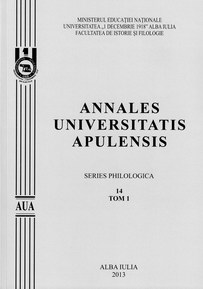The Poetics of Dislocation: Andreï Makine
Poetica dislocării: Andreï Makine
Author(s): Ana Maria ComșaSubject(s): Literary Texts
Published by: Universitatea »1 Decembrie 1918« Alba Iulia
Keywords: poetics of dislocation; Andreï Makine; matricial space; inner geography; binary
Summary/Abstract: The contemporary world means, above all, dislocation and relocation: circulation of ideas, of existential patterns, of values, of people, so that literature could not remain immune to this phenomenon that incorporates it and gives it new dimensions. Literature was always a privileged topos able to move over the boundaries of any kind and to provide the opportunity of choice, the writer being the freest of travelers. Contemporary cultural climate drew attention to an aspect of this issue that brings to the fore a type of writer whose work draws its identity precisely through the poetics of dislocation. Raised in a totalitarian social matrix this writer chooses, forced by circumstances, to distance himself from it and to adopt another social matrix which offers him the privilege of freedom. During the second half of the twentieth century in Europe the escape from communism, from its pressure was the major cause of this phenomenon. Andreï Makine is one of the most popular contemporary "cases" when dislocation generates literature, literature imprinted by two cultures, reflecting the inner oscillation between leaving and staying. Makine's novels mirror the image of a man falling, whose safety net is woven of values condemned by the society he escapes from, the hero - one with autobiographical overtones – looking for them elsewhere. Moreover, Makine's literary works are the expression of antagonism and complementarity between here and there, a nuanced report investigated with a nostalgic realism, judging evil without sidelining good, that keeps the melodrama out. The meeting of the two worlds - native Russia and adoptive France - it's the opportunity for an analysis based not on science but on experience, configuring the profile of a self for whom the dislocation does not mean breaking with the past, but an interior reconfiguration, so that the past and matricial topos to be impossible to repudiate, despite their abysses. In this way, the writer tries to prove that, although external geography may be, circumstantially, enemy of the inner geography, it can not annihilate it and the two can get complementary when past does not mean forgetting. Beyond epic trama and emotion, Makine’s literature earns its modernity through binary: it is a dialogue between cultures filtered by the same analytical self who brings together fragments of time and space in an attempt to prove himself that the absolute antagonism does not exist, there is only human reflex of build it or not.
Journal: Annales Universitatis Apulensis. Series Philologica
- Issue Year: 14/2013
- Issue No: 3
- Page Range: 187-194
- Page Count: 9
- Language: Romanian

